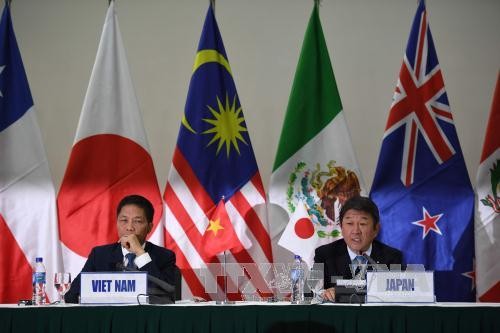TPP changed to Comprehensive and Progressive Agreement for Trans-Pacific Partnership
(VOVWORLD) -Ministers of 11 member countries of the Trans-Pacific Partnership Agreement met in Da Nang over the past three days on the sidelines of the APEC Economic Leaders’ Week 2017 to discuss the realization of the TPP agreement in the new context.

Vietnamese Minister of Industry and Trade Tran Tuan Anh (L) and Japanese Minister of Economic Revitalization Toshimitsu Motegi chaired the TPP media conference in Da Nang on November 11, 2017 (Photo: VNA)
|
They agreed to call the deal Comprehensive and Progressive Agreement for Trans-Pacific Partnership (CPTPP). The Ministers released a statement affirming that they agreed on the core elements of the deal which maintains the overall balance and integrity of the TPP while ensuring the interests of all participants and preserving the inherent right to regulate, including the flexibility of the Parties to set legislative and regulatory priorities. Vietnamese Minister of Industry and Trade Tran Tuan Anh said at a press conference in Da Nang on Saturday: “The Comprehensive and Progressive Trans-Pacific Partnership is not only a difference in the number of participants but also a reflection of determination to open the market.”
Ministers agreed that CPTPP is an agreement that maintains balance of interests of member countries and takes into account their development levels. They tasked officials to continue their technical work including continuing their efforts towards finalizing those items for which consensus has not yet been achieved and legal verification to prepare finalized text for signature. The outcomes of the Trans-Pacific Partnership Ministers’ Meeting in Da Nang will promote regional economic integration, contribute to the economic growth and create new opportunities for workers, families, farmers, businesses and consumers. CPTPP comprises of Australia, Brunei, Canada, Chile, Japan, Malaysia, Mexico, New Zealand, Peru, Singapore, and Vietnam.